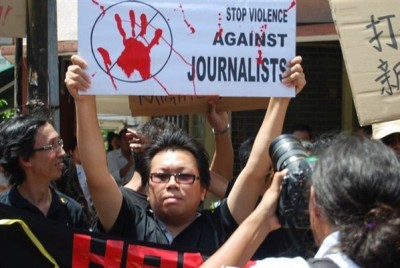Malaysian Prime Minister Najib Razak has said GE13 will be Malaysia’s first ‘social media election’, and has said that the role of social media has been to “greatly encouraged openness among the people”.
Commentators have varied in their response to this statement. Some have argued that it is an admission from the ruling power that the ‘old’ media is increasingly irrelevant, and social media has usurped print media as the main channel to access voters. Others are more sceptical, saying the impact of social media needed to be examined over a long period of time, not just during the election period
It is worth thinking more about Najib’s statement by considering to what extent the Barisan Nasional (BN) has embraced new media technologies as a form of greater openness. I would argue that it is in the interest of the Prime Minister to declare this election as a ‘social media election’ because it gives the impression there is an equal playing field for media access for the opposition as there is for the ruling power. The reality, of course, is quite different, with the BN owning and controlling mainstream media and hindering journalists within these organisations who might speak out for greater openness.
In my article entitled ‘The media freedom movement in Malaysia and the electoral authoritarian regime’, published in the Journal of Contemporary Asia, I argue that while new media technologies has pushed journalism in new directions in Malaysia, the BN government has retaliated through constraints and controls and has actually been mostly successful in managing the media environment in the country.
Through personal interviews with journalists and activists who have supported greater media liberalisation in Malaysia from 1998 to the present day, I argue that the Malaysian electoral authoritarian regime has hardened in its attitude and actions toward media freedom in various “waves” since reformasi. Thus, the period has not been one of sustained media liberalisation embraced by the ruling power. This is important to consider because there is an assumption that as new media technologies are introduced, the result will be increased media freedom and less control from the government. Rather, the process has been potential media liberalisation followed by backlash and retaliation from the ruling power.
In 1998, as websites and blogs were established, the government found it difficult to stop the criticism on the Internet by pro-reformasi activists. It led to new, independent journalism ventures and a memorandum calling for the repeal of the Printing, Presses and Publications Act. Despite this optimism for change expressed online and through new media ventures like Malaysiakini, the government retaliated. The mainstream press continued to be governed by as many as 35 strict laws, and dissenting journalists inside the mainstream press were cracked down upon. While Malaysiakini continued to survive and practise critical journalism, almost all other independent journalism initiatives which were formed during reformasi were not sustained. Many in Malaysia lost their belief that reforms allowing for greater media freedom would ever take place.
In 2008 election, the build-up saw a renewed push for greater freedom of expression, with the re-emergence of a vibrant blogosphere featuring political discussions, and the effective use of social media sites such as Facebook and Twitter. In particular, the Bersih 2.0 movement used social media to great effect to publicise their cause. The election result of course saw BN lose its crucial two-thirds majority, and was heralded as a ‘victory for the opposition’, despite BN remaining in power. Despite this optimism, the post-election period saw a further backlash. The Internal Security Act was used against journalists, with a prominent blogger, Raja Petra, arrested and his website Malaysia Today banned.
The media freedom movement in Malaysia from 1998 does illustrate that the internet and social media can assist the opposition and create a space for openness and debate. Yet despite the increase in Internet usage and creation of all forms of online discourse, the Malaysian regime has managed to subvert or suppress many publications, organisations or individuals who pursued the goal of greater media freedom. It suggests a hardening of a ruling power intent on surviving as an electoral authoritarian regime, rather than pursuing a swift transition to democracy through an acceptance of media liberalisation.
Dr Ross Tapsell is a lecturer in the School of Culture, History and Language at the College of Asia and the Pacific, The Australian National University.
 Facebook
Facebook  Twitter
Twitter  Soundcloud
Soundcloud  Youtube
Youtube  Rss
Rss 